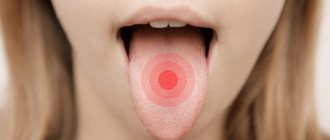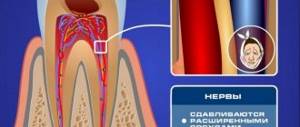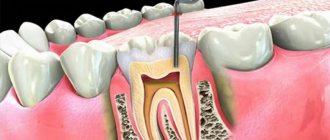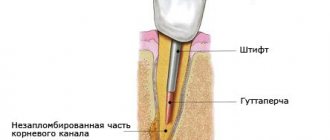We understand what causes unpleasant sensations in a “dead tooth” and determine how to solve the problem. Most of us go to the dentist to restore the beauty of our smile or get rid of painful sensations. One of the most common dental operations is removal of the dental nerve. Of course, at the end of therapy, the patient expects that pain will no longer bother him.
However, quite often a treated tooth without a nerve with a filling or under a crown begins to hurt. To understand why a tooth without a nerve hurts, you need to find out how the pulp removal procedure occurs and figure out what exactly causes the pain.
Why can a tooth hurt if the nerve has been removed a long time ago?
In medical practice, there are cases when a tooth that was pulpless a month, or even a year ago, suddenly begins to hurt. At first, it may be a barely noticeable discomfort, a reaction to hot or cold. However, soon the unpleasant sensations develop into acute pain, in addition, it often comes to swelling, suppuration and tumors. An unambiguous answer to the question “why does a tooth that has been healed for a long time begin to hurt?” difficult - doctors currently cite several of the most common and obvious reasons:
- Incomplete depulpation. In other words, if for some reason the nerve was not completely removed, sooner or later it will definitely make itself felt. The process of pulp removal is very complex, requiring maximum precision and care from the doctor. In this case, experience also plays an important role - a young specialist who is thoroughly familiar with the theory is unlikely to be able to cope with this task better than a dentist seasoned by many years of medical practice. If the nerve is not completely removed, over time you will inevitably have to deal with pain and a variety of complications. By the way, if the patient has a pronounced reaction of the tooth to cold or hot, most likely it is the nerve that has not been completely removed.
- Poor quality filling after depulpation. This reason is also quite common in medical practice. For a better understanding of the situation, let us explain: the root canal of a tooth has a thickness of 0.5 to 1 mm, in an expanded form (after processing with special tools) - up to 2 mm. The shape and bends are individual for each individual channel - they can be straight, with bends, with creases. It is not always possible to see this on an x-ray, so the doctor has to work “blindly”, by touch. It is not surprising that in some cases part of the canal remains unfilled. And it is in this part that bacteria accumulate over time, causing inflammation and leading to pain. Also, the filling itself may not lie tightly, allowing access to pathogenic microorganisms.
- Increased pressure on the tooth. The tooth does not just stand in the jaw bone - it is attached to it by numerous threads of connective tissue. If during the filling process the doctor installs a filling that is too high, then the chewing load on this tooth will increase significantly, which, accordingly, will increase the load on the ligaments. Over time, the increased pressure will turn into a constant aching pain, especially evident when pressed.
- Infection. If we assume that the nerve has been completely removed and all the canals have been thoroughly cleaned and securely sealed, there is only one option left - the activity of pathogenic bacteria that entered the root canals and then into the jaw tissue during the treatment of caries or pulpitis.
- Insufficient hygiene. After high-quality depulpation, the patient needs high-quality regular oral hygiene. Even under the most reliable filling, bacteria can accumulate over time if you do not brush your teeth in a timely manner. Some patients believe that dental plaque does not accumulate on the filling material and is not afraid of tartar. In fact, this is not so - bacteria have an equally destructive effect on both tooth enamel and artificial fillings. The infection can get to the root of the tooth and from the gums - this is especially true for people suffering from periodontal diseases.
- In fact, one of the neighboring “living” teeth hurts.
Naturally, it takes time for bacteria to accumulate in an unfilled canal or for an infection to make itself felt. It is likely that a tooth can get sick in a year or after 5 years - it all depends on the degree of neglect of the problem, as well as on the individual characteristics of the body (people with strong immunity tolerate inflammation much easier, so they may not notice alarming manifestations for longer).
In any of the above cases, the tooth will have to be re-treated - the filling will have to be removed, the canals will have to be cleaned and filled again. In addition, a number of additional disinfection measures will have to be carried out.
Symptoms
Most often, painful sensations occur during chewing or eating hot or cold food. Some patients complain of almost constant, aching or throbbing pain.
The inflammatory process can develop rapidly. In this case, the pain is usually sharp and severe. May be accompanied by swelling of the gums and swelling of the face. Sometimes the inflammation lasts for years, and since the patient does not experience severe pain, he delays the visit to the dentist, aggravating the situation.
Why can a tooth hurt immediately after nerve removal?
It also happens that immediately after the end of the anesthesia (and the procedure for removing nerves is invariably accompanied by the use of local anesthetics), the patient begins to experience acute pain in the dead tooth. There may be several reasons for this:
- The filling material got from the root of the tooth onto the soft gum tissue. This situation can occur if the material is fed into the root canals under very high pressure. In addition, this often occurs due to incorrect measurement of the channel length. To avoid this problem, it is necessary to take pictures before and after depulpation, and if defects are detected, immediately remove the filling, remove excess paste and reseal the canals.
- Remains of dental instruments in the canal. The needles for widening the canals and removing nerves are very thin. Even though modern instruments are made from high-quality materials, there is a small chance that a small piece of needle will remain in the canal, causing discomfort and pain.
- Damage to the tooth root. During the process of cleaning canals and removing nerves, there is a possibility of drilling through the root of the tooth, resulting in an open cavity leading directly into the jawbone (which, by the way, can also be damaged due to drilling too deep).
- The body's reaction to filling material. Or simply an allergy. Anyone can encounter this, especially if the patient has not previously had to deal with dental intervention. In this case, it is necessary to urgently remove the filling and repeat the procedure using a different material.
All of the above causes of tooth pain after nerve removal are pathological and require urgent medical intervention.
It is important to understand that immediately after treatment, a tooth with a removed nerve may hurt for some time for a number of reasons:
- Depulpation is a process of violating the integrity of nerve tissue, which cannot be completely painless. After the local anesthesia wears off, the patient still feels discomfort and aching pain for some time, which can be relieved with toothache tablets.
- A reaction to cold and hot things in the first couple of days after nerve removal is normal. Due to the violation of the integrity of the tooth tissue, its sensitivity also increases, which goes away after complete healing.
In order for the recovery period to pass quickly and painlessly, it is necessary to strictly follow the recommendations of the attending physician - do not drink or eat for 2 hours after the operation, observe the rules of hygiene, take anti-inflammatory and painkillers.
When should you see a doctor?
Dentists themselves recommend not delaying a visit to the clinic if the slightest alarming symptoms occur:
- Acute throbbing pain in the first hours after depulpation.
- The presence of edema, a swollen cheek or gum, the formation of an abscess under a tooth without a nerve.
- Manifestation of tooth reaction to cold and hot long after dental intervention.
- The pain after the operation does not subside, but on the contrary, it becomes stronger.
- An increase in body temperature (indicates the presence of an inflammatory process).
- Pain when pressing on a tooth or chewing.
If you contact an experienced doctor in a timely manner, any problems can be solved as soon as possible.
Should I tolerate post-filling pain or not?
My tooth hurts under a filling, what should I do? First of all, do not panic, but calmly understand the situation. If a tooth hurts after a filling, the nature of the pain and the appearance of some other symptoms matter.
Tooth hurts under temporary filling
The intensity of pain under a temporary filling should gradually decrease.
Can a tooth hurt under a temporary filling? Of course, it can, but natural pain is not severe, and its intensity gradually decreases. The tooth hurts after filling, mainly during the day, when it is subjected to one or another impact - pressure (chewing hard food), drinking hot, cold or sour drinks.
Possible reasons
Most often, this is normal; the tooth begins to ache for natural reasons. Painful sensations can also occur due to overheating of tissues during preparation, light-curing of fillings, problems with drying the dental cavity after preparation, or fillings that are excessive in height.
What's the best way to relieve pain?
For natural pain and pain associated with minor violations of the treatment process, it is enough to rinse your mouth with an infusion of chamomile flowers and take an anesthetic (Analgin, Pentalgin, Nise).
Acute pain after filling
Very often, a tooth hurts after root canal cleaning and filling. The acute nature of the pain syndrome is associated with injury or inflammation of sensitive tissues - pulp or periodontium. Much also depends on the pain sensitivity of the patient himself.
Possible reasons
Incomplete removal of pulp from the tooth cavity.
What's the best way to relieve pain?
Take painkillers and see a dentist.
Throbbing pain after filling
If the tooth hurts severely after filling, the pain has become throbbing, then this is a sign of inflammation of the pulp - pulpitis. A sharp headache often appears.
Possible reasons
The cause of pulsating pain syndrome may be poor-quality treatment of the dental cavity and root canals, possibly perforation of the walls.
What's the best way to relieve pain?
Take any painkiller orally and immediately contact your dentist.
Only a dentist can relieve throbbing pain
Aching pain after filling
When a tooth aches after a filling is placed, this is normal. How long a tooth hurts after canal filling depends on the complexity of the manipulations performed. The intensity of the pain is important: if it increases, the pain intensifies sharply when pressed, then this is a symptom of incipient inflammation. A decrease in intensity is a favorable sign.
Possible reasons
This is natural pain in a filled tooth.
What's the best way to relieve pain?
Rinse with a decoction of oak bark or an infusion of chamomile flowers. If the pain seems too severe, take a pain reliever.
Pain when pressing
If a tooth hurts after a filling when you bite it, then most often it has natural causes and goes away in five to seven days.
Possible reasons
If, after filling, a tooth hurts when pressed, then most often this is a consequence of treatment and injury to dental tissues.
What's the best way to relieve pain?
Temporarily avoid chewing food on the side of the filling, rinse your mouth with light antiseptics and herbal decoctions.
Why does a tooth hurt when pressed?
If the tooth does not bother you until you start chewing or pressing on it, most likely the reason lies in problems with the ligaments that “attach” the tooth to the jawbone, or due to slight swelling that will subside in a few days.
However, there are other reasons:
- A fragment of a dental needle remained in the canal.
- Excess filling material has gone beyond the root of the tooth and landed on the jaw bone.
- The nerve was not completely removed (in this case the tooth hurts even with light tapping).
- During the treatment of caries, an infection got into the root canals.
If you feel a sharp pain when pressing, it hurts to chew and even speak, you must urgently go to the clinic, take an x-ray and repeat the operation to clean and fill the canals, having previously eliminated possible foci of inflammation.
This Personal Data Privacy Policy (hereinafter referred to as the Privacy Policy) applies to all information that (hereinafter referred to as the company), whose website is located on the domain name linedent.ru, can receive about the User while using the website, programs and products of the company.
DEFINITION OF TERMS
1.1. The following terms are used in this Privacy Policy: 1.1.2. “Personal data” - any information relating to a directly or indirectly identified or identifiable individual (subject of personal data). 1.1.3. “Processing of personal data” - any action (operation) or set of actions (operations) performed using automation tools or without the use of such means with personal data, including collection, recording, systematization, accumulation, storage, clarification (updating, changing), extraction, use, transfer (distribution, provision, access), depersonalization, blocking, deletion, destruction of personal data. 1.1.4. “Confidentiality of personal data” is a mandatory requirement to not allow their dissemination without the consent of the subject of personal data or the presence of another legal basis. 1.1.5. “Site User (hereinafter referred to as the User)” is a person who has access to the Site via the Internet.
GENERAL PROVISIONS
2.1. Processing and ensuring the security of Data is carried out in accordance with the requirements of the Constitution of the Russian Federation, the Law, the Labor Code of the Russian Federation, by-laws, and other federal laws of the Russian Federation defining cases and features of Data processing. 2.2. The User’s use of the website linedent.ru means acceptance of this Privacy Policy and the terms of processing of the User’s personal data. 2.3. In case of disagreement with the terms of the Privacy Policy, the User must stop using the site linedent.ru 2.4. This Privacy Policy applies only to the website linedent.ru The Company does not control and is not responsible for third party websites that the User can access via links available on its website. 2.5. The site administration does not verify the accuracy of the personal data provided by the site user.
SUBJECT OF THE PRIVACY POLICY
3.1. This Privacy Policy establishes the obligations of the Site Administration to non-disclose and ensure a regime for protecting the confidentiality of personal data that the User provides at the request of the Site Administration when registering on the site or when placing an order for the purchase of Services. 3.2. Personal data permitted for processing under this Privacy Policy is provided by the User by filling out the registration form on the Website linedent.ru and includes the following information:
3.2.1. last name, first name, patronymic of the User; 3.2.2. User's contact phone number; 3.2.3. email address (e-mail). 3.3. The Company protects Data that is automatically transmitted during viewing of advertising blocks and when visiting pages on which the system’s statistical script (“pixel”) is installed:
IP address; information from cookies; information about the browser (or other program that accesses advertising); access time; address of the page on which the advertising unit is located; referrer (address of the previous page).
3.3.1. Disabling cookies may result in the inability to access parts of the site that require authorization. 3.3.2. The company collects statistics about the IP addresses of its visitors. This information is used to identify and resolve technical problems. 3.4. Any other personal information not specified above is subject to secure storage and non-distribution, except for the cases provided for in paragraphs. 5.2. and 5.3. of this Privacy Policy.
PURPOSES OF COLLECTING USER'S PERSONAL INFORMATION
4.1. The Site Administration may use the User’s personal data for the following purposes: 4.1.1. Identification of the User registered on the website for placing an order and (or) concluding an Agreement. 4.1.2. Providing the User with access to personalized resources of the Site. 4.1.3. Establishing feedback with the User, including sending notifications, requests regarding the use of the Site, provision of services, processing requests and applications from the User. 4.1.4. Determining the location of the User to ensure security and prevent fraud. 4.1.5. Confirmation of the accuracy and completeness of personal data provided by the User. 4.1.6. Creating an account if the User has agreed to create an account. 4.1.7. Providing the User with effective customer and technical support if problems arise with the use of the Site. 4.1.8. Providing the User with his consent, information about prices, newsletters and other information. 4.1.9. Carrying out advertising activities with the consent of the User. 4.1.10. Providing the User with access to partner sites or services in order to receive products, updates and services.
METHODS AND TERMS OF PROCESSING PERSONAL INFORMATION
5.1. The processing of the User's personal data is carried out without a time limit, in any legal way, including in personal data information systems using automation tools or without the use of such tools. 5.2. The User agrees that the Site Administration has the right to transfer personal data to third parties, in particular, courier services, postal organizations, telecommunication operators, solely for the purpose of fulfilling the User’s order. 5.3. The User’s personal data may be transferred to authorized government bodies of the Russian Federation only on the grounds and in the manner established by the legislation of the Russian Federation. 5.4. In case of loss or disclosure of personal data, the Site Administration informs the User about the loss or disclosure of personal data. 5.5. The site administration takes the necessary organizational and technical measures to protect the User’s personal information from unauthorized or accidental access, destruction, modification, blocking, copying, distribution, as well as from other unlawful actions of third parties. 5.6. The site administration, together with the User, takes all necessary measures to prevent losses or other negative consequences caused by the loss or disclosure of the User’s personal data. 5.7. The site administration warns in advance about a change of site owners so that the User can delete his account and his personal data.
OBLIGATIONS OF THE PARTIES
6.1. The user is obliged to: 6.1.1. Provide information about personal data necessary to use the Site. 6.1.2. Update, supplement the provided information about personal data if this information changes. 6.2. The site administration is obliged to: 6.2.1. Use the information received solely for the purposes specified in clause 4 of this Privacy Policy. 6.2.2. Ensure that confidential information is kept secret, not disclosed without the prior written permission of the User, and also not sell, exchange, publish, or disclose in other possible ways the transferred personal data of the User, with the exception of paragraphs. 5.2. and 5.3. of this Privacy Policy. 6.2.3. Take precautions to protect the confidentiality of the User's personal data in accordance with the procedure usually used to protect this type of information in existing business transactions. 6.2.4. Block personal data relating to the relevant User from the moment of application or request from the User or his legal representative or the authorized body for the protection of the rights of personal data subjects for the period of verification, in the event of detection of unreliable personal data or unlawful actions.
ADDITIONAL TERMS
7.1. The site administration has the right to make changes to this Privacy Policy without the consent of the User. 7.2. The new Privacy Policy comes into force from the moment it is posted on the Site, unless otherwise provided by the new edition of the Privacy Policy. 7.3. Any suggestions or questions regarding this Privacy Policy should be reported to 7.4. The current Privacy Policy is located on the page at
What complications may arise?
Pain is one of our body's defense mechanisms. If there is pain, it means one of the systems is not working correctly, and there is a certain pathology. If you do not pay attention to these signals for help in time, you may encounter serious complications:
- Inflammation under the tooth. At first it will be concentrated in one place. But in the absence of proper treatment, it will spread to nearby tissues, and then, through the bloodstream, throughout the body.
- Infection of adjacent teeth. If the cause of the pain is the proliferation of pathogenic bacteria, it is likely that the infection will spread to the soft tissue of the gums and then spread throughout the entire oral cavity.
If, after removing a nerve, a wisdom tooth hurts, then, contrary to popular belief, it is not necessary to remove it - if it is possible to repeat the treatment, eliminating the source of infection and inflammation, the doctor will definitely do everything in his power to save the tooth.
In the most advanced cases, the doctor usually decides to remove the filled tooth.
If pain occurs when pressing on a filled tooth
It happens that outwardly the unit looks fine (the filling is sealed, the crown has not changed its color), but, nevertheless, painful symptoms periodically make themselves felt. This situation is considered normal only in the first day after the filling is installed. Then the pain should disappear. If it persists for a long time, then something is wrong.
Most likely, an inflammatory reaction has developed. She needs to be docked. To do this, you should make an appointment with your dentist. The doctor will conduct an in-person examination, instrumental examination, and take pictures. This will allow him to understand why the pain appeared and, based on the information received, create a progressive treatment plan.
How to relieve pain?
The process of treating a damaged tooth is very complex and time-consuming. It often takes several visits to the doctor to completely eliminate the cause of the pain. At the same time, in order to somewhat reduce pain, it is quite acceptable to use painkillers, especially considering the fact that most of them also have an anti-inflammatory effect:
- Ibuprofen.
- Aertal.
- Ketanov.
- Nimesil.
- Nise.
- Paracetamol (may help with moderate pain).
In addition, you can numb an open tooth using special lidocaine-based sprays.
Don’t forget: pain relief is just a means to eliminate discomfort, but unfortunately, no pill, even the strongest and highest quality, can cope with the source of the disease.
Category: Tooth extraction Published by Mister stomatolog
Is it possible to cure a tooth on your own?
Remember: it is impossible to cure a tooth on your own, without the help of a specialist! All means - medications, folk recipes - have only a temporary, disinfecting and alleviating effect. To get rid of pain, you need to make a correct diagnosis and eliminate the cause, and this can only be done by a dentist in a specialized medical institution using modern diagnostic and treatment technologies. Recommendations for self-treatment of a tooth under a filling can lead to the development of complications even faster.
Category Miscellaneous Published by Mister dentist











